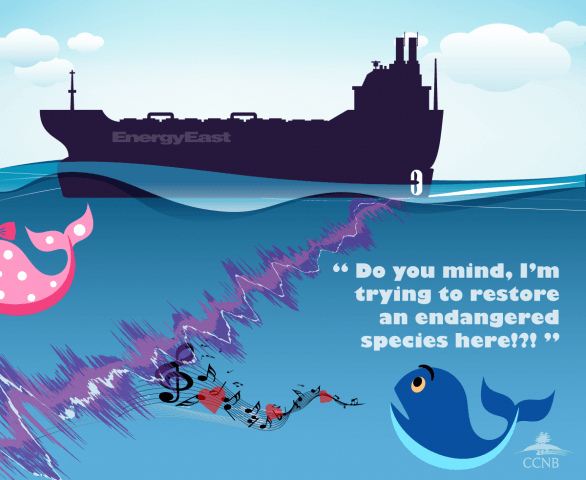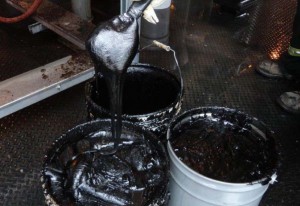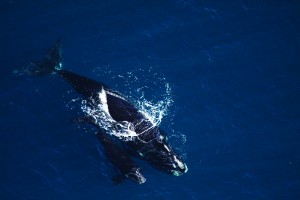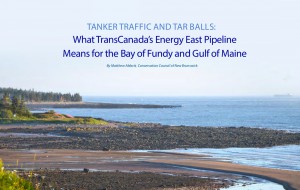
This commentary appeared in the Monday, Aug. 24 edition of the New Brunswick Telegraph-Journal and the Thursday, Sept. 17 edition of The Daily Gleaner.
BY MATTHEW ABBOTT
The Energy East Pipeline project, a proposal of Alberta-based TransCanada Corporation, would make gamblers of us all.
A single tanker spill of oilsands bitumen in the Bay of Fundy — currently the only export harbour for the cross-country bitumen pipeline — could irreparably damage the two industries that have been the cornerstone of the economy in this region for generations: fisheries and tourism.
With an estimated 5,000 New Brunswickers working in fisheries alone, by welcoming the Energy East pipeline our province is gambling thousands of existing jobs for the prospect of short-term construction work that would leave the Bay of Fundy and those who rely upon it at risk for the long term.
Following are some key findings included in the report released this week by the Conservation Council of New Brunswick, Tanker Traffic and Tar Balls: What TransCanada’s Energy East Pipeline Means for the Bay of Fundy and Gulf of Maine.
Jobs at risk
Bitumen, the product that would flow through the pipeline at up to 1.1 million barrels per day, is much different than the oil you put in your car. Too thick and sludgy to pump in its raw state, bitumen must be mixed with a cocktail of chemicals just so it’s able to pass through pipelines. The health effects many of these chemicals have on people and animals are still unknown.

A 2013 report from the federal government confirmed that bitumen can form into tarballs and sink when mixed with salt water in the kind of conditions we see daily in the Bay of Fundy. This would spell disaster for many fisheries in the Bay of Fundy, but would be particularly devastating to the bottom-feeding lobster and scallop fisheries, the bay’s most significant catches.
More and more, customers are able to track and want to know where the premium seafood they’re eating is caught, meaning a region’s reputation is now critical to the success of its fishing industries. A bitumen spill in the Bay of Fundy would ruin the region’s well-earned reputation as a relatively pristine marine environment.
The same goes for tourism. Tourism operators rely on the charismatic animals in the Bay of Fundy to make their living, including whales, porpoise, seals, ocean sunfish, sharks, and seabirds. Increased shipping traffic could drive these attractions away from the bay, while a spill would threaten Fundy’s reputation as an internationally-acclaimed destination for experiencing nature and wildlife, making it difficult to attract tourists in a very competitive global market.
The likelihood of an effective emergency response when a spill occurs in the Bay of Fundy is another big question mark hanging over the pipeline proposal. No studies have been done to rate the capacity of emergency response in the bay, and past spills have been lost at sea as the bay’s world-famous tides and heavy fog made clean-up efforts effectively impossible.
Whales at risk
The Bay of Fundy is poised to get a lot more crowded. There are currently several projects being proposed that would see a significant increase in tanker traffic coming into the bay. TransCanada’s Energy East Pipeline represents the most substantial increase, adding between 115-290 tankers per year depending on whether a second export terminal location is announced. Contrary to the company’s claims, analysis shows upwards of 80 per cent of the product passing through the pipe will be loaded on ships for sale in foreign markets, not for domestic use.

A study involving North Atlantic right whales in the Bay of Fundy showed the noise from tanker traffic causes heightened levels of stress in whales. Whales communicate on the same frequency as the noise created by ship engines, so whales effectively have to ‘shout’ to hear one another above the engine’s roar. We don’t know how much noise pollution a body of water can take before whales can’t communicate at all.
It’s like us having to holler over the roar of a transport truck, only constant for whales when these tankers make their slow pass.
With only 510 estimated alive today, the North Atlantic right whale is the most endangered large whale on the planet. We are lucky to have it, along with several other species of large whales, visit the Bay of Fundy, creating employment for a good deal of New Brunswickers and creating lifelong memories for many more residents and visitors.
We should be working to restore this endangered species’ population, not creating a marine environment where it will be under increasingly more stress and strain.
What should be done
Our report, which can be read or downloaded at conservationcouncil.ca, included several recommendations to the company and decision makers.
Among these recommendations were calls for an independent environmental impact assessment in N.B., an independent assessment to study the impact of tanker traffic or a bitumen spill on the fisheries and tourism sectors in NB, and a call on all levels of government to bolster job creation by increasing investments in energy efficiency programming and renewable power.
If acted upon, the Conservation Council believes its recommendations will demonstrate that TransCanada’s Energy East Pipeline proposal is not in the best interest of New Brunswickers and should not be pursued.
No one should be comfortable gambling with the future of the Bay of Fundy. And TransCanada’s Energy East Pipeline proposal is not a safe bet.


